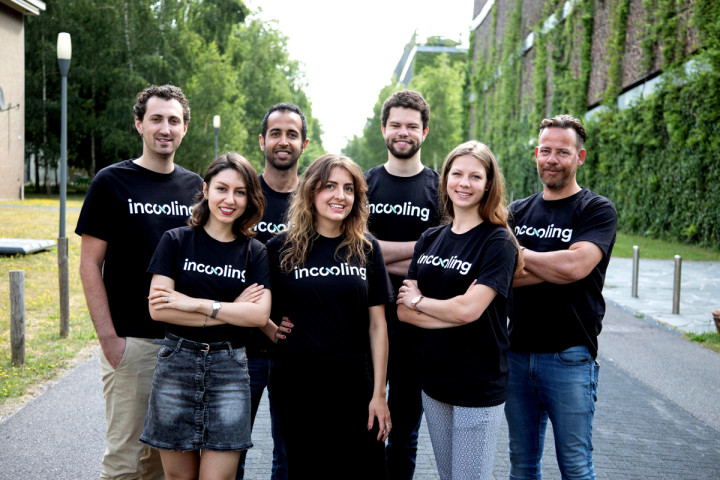HTXL pivots: 'The right idea in the right place at the right time'
The new model is far more time- and labor-intensive. The pivot involved moving from accelerating teams building high-tech products to taking CERN technology, then finding the right people for the teams and determining which application areas are relevant.
Then, HighTechXL extended the venture-building period nine months from the 90-day accelerator, converting some proven acceleration managers to founders and cofounders of the new ventures.
“That was a massive change in the organizational model,” Guus said.
That high level of trust and buy-in from ASML and other members of the Eindhoven Startup Alliance “adds so much credibility to a venture.”
It hasn’t been all smooth sailing. Dynaxion struggled early with a team in flux as well as too many false starts and lack of clarity for the best and highest use for CERN’s small quadrupole linear particle accelerator/collider. The goal now is to create a better way to scan everything from the 100 billion packages projected to be shipped worldwide by 2020 to luggage at the airport.
“With Dynaxion, maybe we’ve been a bit too enthusiastic," Guus said. "I remember CERN said, ‘We admire you for being so brave to pick up one of the most complicated things out of our labs."
Trying to incorporate the linear accelerator into a scanning device demands a longer development cycle and significant initial capital. “But on the other hand, this venture can completely change the landscape of security screening. The evidence is there with the whole tender from the White House,” Guus said.
Dynaxion was chosen in April for the Opioid Detection Challenge sponsored by a number of United States federal agencies including Homeland Security, the U.S. Postal Inspection Service and U.S. Customs and Border Protection. Those agencies believe Dynaxion’s particle accelerator tech has the potential to scan packages for illegal substances including heroin and other opiates, and Dynaxion received $100,000 in funding.
Incooling has also taken the startup world by storm, raising more than 600,000 euros with new commitments every day from international partners.
Aircision is using CERN’s structured laser beam technology to conduct a Free Space Optics test on High Tech Campus later this year. The experiment will help test the capabilities of 5G, the next frontier in telecommunications. They’ve raised their first round of funding and received €40K in subsidies to put toward the FSO test. And they are in talks with several telecom giants who want to partner with the young startup.
The success of the three proves Eindhoven is all about deep tech, Guus said.
"And of course a bit of luck.”

Then, HighTechXL extended the venture-building period nine months from the 90-day accelerator, converting some proven acceleration managers to founders and cofounders of the new ventures.
“That was a massive change in the organizational model,” Guus said.
“I’m super impressed by what can be done in nine months. But we could only do it because we could unlock the specific knowledge networks we have in place in the region."
That high level of trust and buy-in from ASML and other members of the Eindhoven Startup Alliance “adds so much credibility to a venture.”
It hasn’t been all smooth sailing. Dynaxion struggled early with a team in flux as well as too many false starts and lack of clarity for the best and highest use for CERN’s small quadrupole linear particle accelerator/collider. The goal now is to create a better way to scan everything from the 100 billion packages projected to be shipped worldwide by 2020 to luggage at the airport.
“With Dynaxion, maybe we’ve been a bit too enthusiastic," Guus said. "I remember CERN said, ‘We admire you for being so brave to pick up one of the most complicated things out of our labs."
Trying to incorporate the linear accelerator into a scanning device demands a longer development cycle and significant initial capital. “But on the other hand, this venture can completely change the landscape of security screening. The evidence is there with the whole tender from the White House,” Guus said.
Dynaxion was chosen in April for the Opioid Detection Challenge sponsored by a number of United States federal agencies including Homeland Security, the U.S. Postal Inspection Service and U.S. Customs and Border Protection. Those agencies believe Dynaxion’s particle accelerator tech has the potential to scan packages for illegal substances including heroin and other opiates, and Dynaxion received $100,000 in funding.
Incooling has also taken the startup world by storm, raising more than 600,000 euros with new commitments every day from international partners.
Aircision is using CERN’s structured laser beam technology to conduct a Free Space Optics test on High Tech Campus later this year. The experiment will help test the capabilities of 5G, the next frontier in telecommunications. They’ve raised their first round of funding and received €40K in subsidies to put toward the FSO test. And they are in talks with several telecom giants who want to partner with the young startup.
The success of the three proves Eindhoven is all about deep tech, Guus said.
"But it's the matter of putting the network and the local region in motion behind these propositions.
"And of course a bit of luck.”

Read full article
Hide full article


Discussion (0 comments)